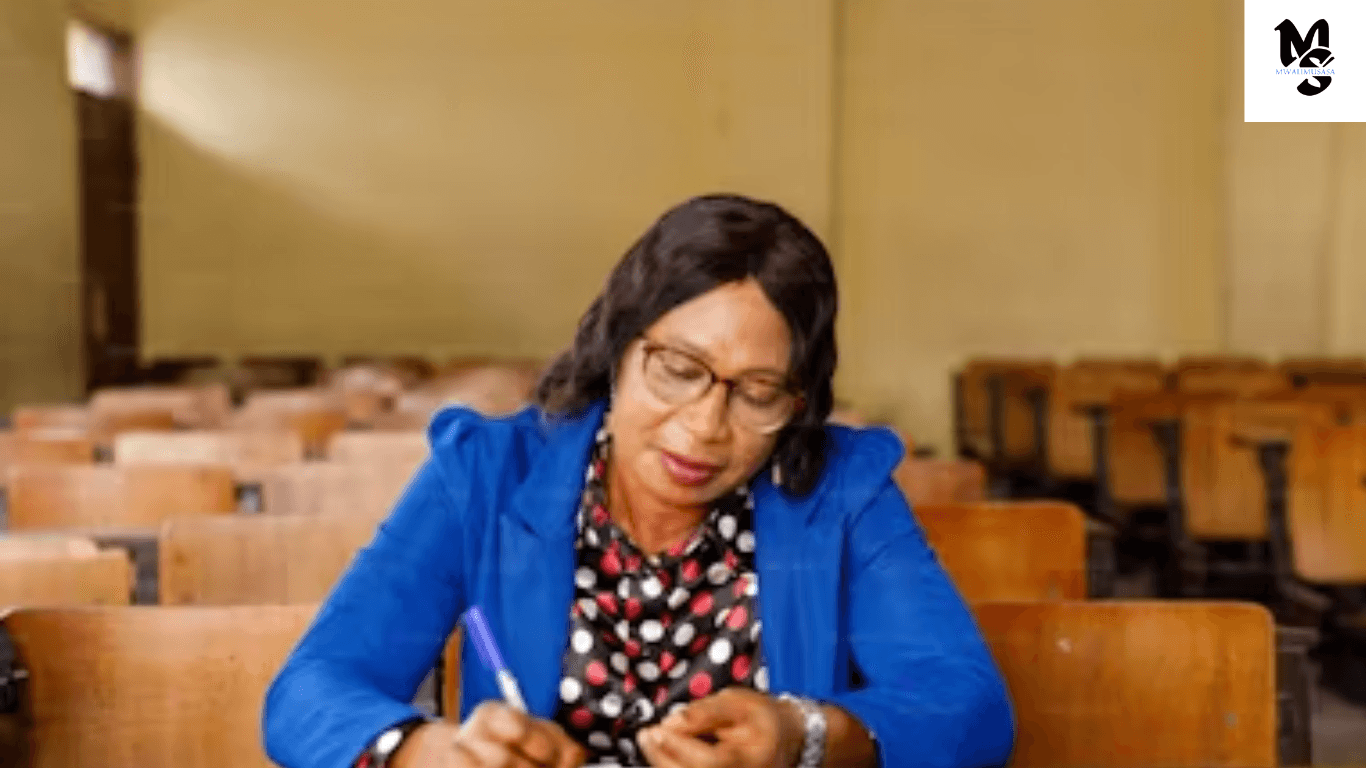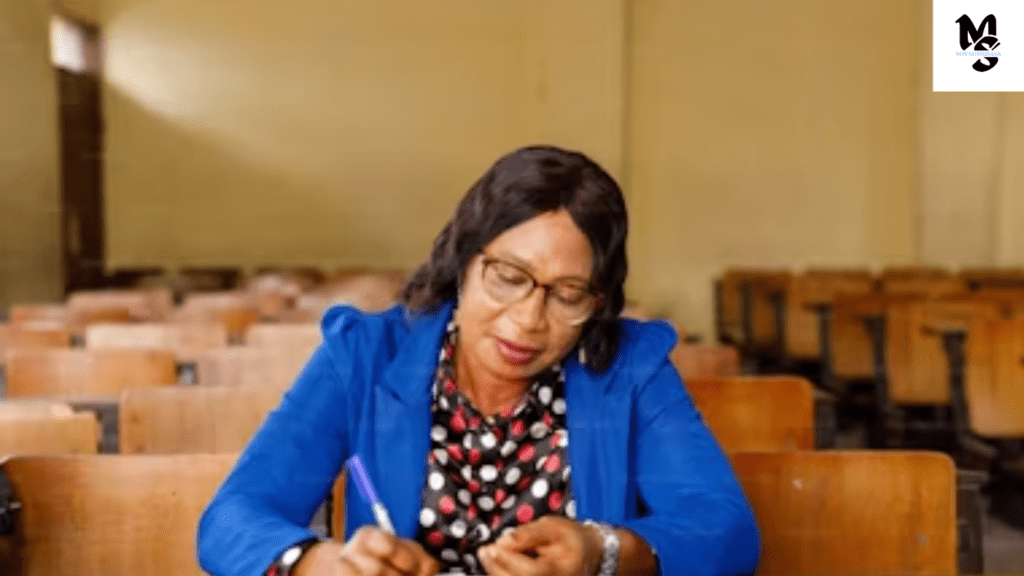Dealing with Post-Interview Anxiety: Tips for Teachers

A female teacher in a classroom making notes

Introduction
Post-interview anxiety is a common experience among teachers, often manifesting as feelings of doubt, stress, and uncertainty after a job interview. This phenomenon can significantly impact their mental well-being, influencing their job search process and overall confidence in professional abilities. The pressure to secure a desirable position in the educational field, combined with the competitive nature of the job market, contributes to heightened levels of anxiety for many educators.
Teachers, like other professionals, invest considerable effort and emotion into the interview process. They prepare extensively, showcasing their qualifications, teaching philosophy, and classroom management skills. However, once the interview concludes, the mind often races with what-if scenarios and ruminative thoughts. Such post-interview reflections can lead to damaging patterns of thinking, making it essential to address these feelings proactively. Understanding that post-interview anxiety for teachers is a shared experience can be a powerful starting point in managing these stressors.
Moreover, the impact of post-interview stress can extend beyond immediate feelings of anxiety. It can disrupt focus, hinder productivity, and even lead to burnout if left unchecked. Teachers may find themselves struggling with negative thoughts, questioning their capabilities, or fearing rejection from potential employers. By recognizing and validating these emotions, educators can better navigate their job search journey, implementing strategies to manage stress effectively.
The teaching profession is driven by a commitment to nurturing the minds of students, and maintaining their own mental health is vital for sustained success. Acknowledging that post-interview anxiety is prevalent within the teaching community helps create a framework for resilience, fostering a supportive environment where educators can thrive. Engaging in activities that promote mindfulness for teachers can be an effective approach to counteract the prevalent anxiety and build a positive mindset moving forward.
Acknowledging Anxiety
Experiencing anxiety after an interview is a common reaction, particularly for teachers facing the high-stakes environment of job selection. The process of interviewing can evoke a myriad of emotions, leading to what is commonly referred to as post-interview anxiety for teachers. This reaction often stems from several identifiable triggers that are unique to the profession. One primary source of this anxiety is the intense pressure teachers feel to impress the interview panel, which is often comprised of seasoned educators who understand the crucial nature of the role in a student’s life.
Moreover, many teachers grapple with fears regarding their candidacy, pondering over potential perceived shortcomings or the belief that they might not be the most suitable fit for the position. The rigorous selection process, combined with the desire to contribute positively to students’ educational experiences, further amplifies feelings of inadequacy or concern about not being selected. Recognizing these emotions as normal reactions can be a crucial step towards managing stress after the TSC interview.
Symptoms of post-interview anxiety may manifest in various ways, such as intrusive thoughts, restlessness, or difficulty concentrating. It is vital for educators to acknowledge these feelings rather than dismiss them as weaknesses. Understanding that these emotional responses are linked to the inherent pressures associated with teaching roles can foster a healthier perspective on coping with teacher interview anxiety. Taking proactive steps, such as reframing negative thoughts and focusing on productive waiting strategies, can enhance mental health after the interview process. By confronting and acknowledging their anxiety, teachers can take meaningful strides towards reducing stress after interviews, thereby cultivating a positive mindset as they await feedback on their candidacy.
Tips for Managing Anxiety
Post-interview anxiety for teachers can often feel overwhelming, but there are several practical strategies to alleviate this discomfort. One effective approach involves the incorporation of mindfulness techniques, such as meditation and deep breathing exercises, which can serve as powerful tools for managing stress after TSC interviews. Engaging in these practices helps calm the mind and fosters a sense of peace. For instance, dedicating just a few minutes each day to deep breathing can significantly reduce anxiety levels, thereby enhancing post-interview mental health.
In addition to mindfulness, staying busy with productive activities can effectively combat feelings of anxiety. Engaging in hobbies or tasks that require focus can help keep the mind occupied, reducing the tendency to dwell on stressful thoughts. Activities such as reading, gardening, or even organizing classroom materials can redirect attention and foster a positive mindset. This approach not only aids in handling post-interview stress but also provides a welcome distraction from worries about the outcome of the interview.
Coping with teacher interview anxiety is also facilitated through social interactions. Connecting with fellow teachers or friends to share experiences and feelings can create a supportive network that aids in reframing negative thoughts. By discussing common concerns, individuals can gain perspective, making it easier to stay positive after interviews. Alongside these strategies, incorporating physical exercise into your routine can further enhance emotional well-being. Regular exercise has been shown to reduce stress and improve overall mood, serving as an effective method for managing anxiety.
In conclusion, the combination of mindfulness practices, engaging in productive activities, and fostering supportive social connections can significantly help teachers manage post-interview anxiety. By employing these strategies, educators can maintain a positive outlook while navigating the uncertainties that follow an interview.
Reframing Negative Thoughts

Post-interview anxiety for teachers often stems from the tendency to dwell on negative thoughts and outcomes. It is crucial to recognize that the mind can easily spiral into a cycle of self-doubt and criticism after an interview. To counter this, teachers can utilize cognitive restructuring techniques. This process involves identifying negative thoughts, challenging their validity, and reframing them into more positive perspectives. For example, instead of thinking, “I fumbled my answers,” a teacher might reframe the thought to, “I learned valuable lessons from my responses.” This simple shift can significantly reduce stress after interviews.
Another important aspect is practicing self-compassion. Teachers may find themselves overly critical, analyzing every detail of their performance. By acknowledging their feelings and treating themselves with kindness, educators can mitigate post-interview mental health struggles. It is essential to remember that no interview is perfect; thus, accepting imperfections is a step toward emotional resilience. Incorporating mindfulness for teachers can also help ground oneself in the present moment rather than obsessing over past mistakes or worrying about future uncertainties.
To enhance coping with teacher interview anxiety, it is helpful to develop productive waiting strategies. Rather than letting the waiting period be filled with fretful thoughts, using this time to engage in hobbies, professional development, or relaxation techniques can boost one’s mood. This proactive approach not only reduces stress but also promotes a healthy mindset towards future opportunities. Teachers should encourage themselves to reframe their thoughts continuously, transforming perceived failures into growth experiences. By fostering a more constructive inner dialogue, educators can embrace the post-interview period with a sense of hope and positivity.
Staying Engaged While Waiting
The waiting period after an interview can be a source of significant post-interview anxiety for teachers. However, this time does not have to be unproductive or filled with worry. Engaging in various activities can foster a sense of purpose and reduce stress after interviews. One effective strategy involves pursuing continued education through workshops and online courses. These opportunities not only enhance teaching skills but also distract from the anxious thoughts that may arise while waiting for a response.
Additionally, teachers can benefit from exploring personal hobbies. Whether it involves painting, reading, or gardening, immersing oneself in personal interests can serve as a productive outlet for emotions. Engaging in hobbies allows for a temporary escape from the tension associated with waiting for the interview outcome, fostering a more positive mindset.
Another practical approach to coping with teacher interview anxiety is volunteering in educational settings, such as tutoring underprivileged students or assisting in community programs. This not only contributes positively to the community but also helps reinforce a teacher’s commitment to the profession, thus enhancing their professional identity during the waiting process.
Connecting with fellow teachers can also be invaluable during this time. Engaging in conversations and sharing experiences provides emotional support and creates a sense of community. Teachers can form small support groups, engage in online forums, or even meet locally to discuss their experiences and feelings. These interactions can significantly aid in handling post-interview stress, as they offer not only camaraderie but also insight from others who have navigated similar situations.
In summary, managing stress after a TSC interview involves staying productive and connected during the waiting period. By focusing on personal development, engaging in hobbies, volunteering, and leaning on a supportive community, teachers can effectively address their post-interview mental health and cultivate a more positive outlook while awaiting their results.
Understanding the Interview Process
The interview process for teachers typically consists of several stages designed to assess both the candidate’s qualifications and their fit within a specific educational environment. Generally, it begins with an application submission, followed by initial screenings that may involve phone interviews or video calls. These preliminary discussions serve to gauge a candidate’s basic competencies and interest in the position. Following this, successful candidates are often invited for in-person interviews, which can include multiple rounds with various stakeholders, such as administrators, current faculty members, and sometimes even students.
Once in the interview room, candidates can expect to discuss their teaching philosophy, classroom management strategies, and subject matter expertise. Evaluation criteria in teacher interviews frequently revolve around pedagogical skills, interpersonal communication, and alignment with the school’s mission and values. It is important to remember that interviews are not merely a test of knowledge but rather an opportunity for candidates to demonstrate their ability to create a positive learning environment. Furthermore, interviews function as a two-way street; they allow teachers not only to present their qualifications but also to assess whether the school’s culture aligns with their professional goals and personal values.
Understanding this mutual exploration can significantly alleviate post-interview anxiety for teachers. Rather than viewing the process as a high-stakes evaluation solely focused on one’s shortcomings, reframing the experience as a conversation can help teachers maintain a positive outlook. This perspective encourages productive waiting strategies after the interview, allowing educators to reflect on their performance without excessive self-criticism. Through mindfulness for teachers, candidates can engage in practices that promote emotional well-being, facilitating a smoother transition into the wait that follows the interview. By grasping the broader context of the interview process, teachers can manage stress after the TSC interview with greater ease and confidence.
Creating a Support System
Establishing a robust support system can be an essential strategy in alleviating post-interview anxiety for teachers. The aftermath of a teaching interview often leads to feelings of uncertainty and self-doubt, making it crucial to connect with individuals who can offer encouragement and constructive feedback. Colleagues and mentors who have navigated similar experiences can be invaluable in providing insights and coping strategies specifically tailored to the educational profession.
Building a network of supportive individuals not only fosters a sense of community but also allows teachers to engage in meaningful dialogues about managing stress after TSC interviews. Sharing experiences can significantly ease the burden of post-interview mental health challenges, allowing teachers to feel less isolated in their thoughts. Professional learning communities (PLCs) serve as excellent platforms for teachers to collaborate, share knowledge, and discuss the emotional toll of the interview process. Within these groups, educators can exchange productive waiting strategies and encourage one another to stay positive after interviews.
Moreover, reframing negative thoughts can be more effectively accomplished when supported by a network. By discussing the interview experience with others who understand the unique stressors faced by educators, teachers can find reassurance and validation for their feelings. Engaging in regular conversations within this support system can also reinforce mindfulness for teachers, helping to cultivate self-awareness and emotional regulation during challenging times.
Ultimately, a well-established support system not only aids in managing stress after interviews but also strengthens resilience against the emotional waves that follow. By proactively seeking out and building connections with others, teachers can better navigate the complexities of post-interview anxiety, leading to healthier coping mechanisms and improved overall well-being in their professional journey.
Visualization Techniques
Visualization techniques can be a powerful tool for teachers dealing with post-interview anxiety. By mentally rehearsing successful outcomes and envisioning themselves in a fulfilling teaching role, educators can effectively manage stress after a TSC interview. This method allows individuals to create a mental image of their future success, helping to establish a positive mindset.
One effective exercise is to find a quiet space where you can relax and focus. Close your eyes and take several deep breaths, allowing your body to release tension. Begin to visualize a successful interview scenario, imagining yourself in the room with interviewers. Picture yourself confidently responding to questions with ease, showcasing your teaching skills. Try to engage all of your senses during this exercise. Visualize not only the environment but also the sounds, smells, and even the emotions you would feel during a successful interview. By engaging in this practice regularly, teachers can bolster their confidence and reduce anxiety levels when preparing for future meetings.
Additionally, envisioning a fulfilling teaching role can be beneficial in combating post-interview stress. Picture yourself in a classroom setting, inspiring and engaging with your students. Imagine the impact you make on their learning journeys, fostering an enjoyable and productive educational environment. Focusing on these positive images can help reframe negative thoughts associated with post-interview anxiety for teachers.
Incorporating visualization into a routine can also serve as a mindfulness practice for teachers. Setting aside a few moments each day to engage in these exercises not only reduces stress after interviews but also enhances overall mental health. Practicing visualization can lead to more productive waiting strategies and help educators stay positive after interviews, further contributing to their long-term success.
Conclusion
As educators, navigating the complexities of the interview process can be an arduous journey filled with various emotions, particularly post-interview anxiety for teachers. It is essential to acknowledge that feeling anxious after an interview is entirely normal. Rather than allowing stress to overwhelm you, it is crucial to employ effective strategies for managing stress after TSC interviews. By recognizing the signs of anxiety and implementing coping mechanisms, teachers can mitigate the impact on their overall well-being.
Throughout this blog post, we emphasized the importance of mindfulness for teachers as a tool for staying grounded during this challenging time. Engaging in mindfulness practices can help promote a sense of calm and clarity, enabling teachers to cope with teacher interview anxiety more effectively. Additionally, we discussed the significance of reframing negative thoughts, which has proved beneficial for reducing stress after interviews. By consciously shifting your perspective, you can transform anxiety into motivation for future opportunities.
It’s also essential to adopt productive waiting strategies while awaiting feedback post-interview. Rather than succumbing to anxiety, consider using this time for professional development, self-reflection, or exploring new teaching methodologies. Staying positive after interviews is vital, as it not only enhances your mental health but also prepares you for subsequent opportunities. The journey of teaching is continuous, and each experience contributes to your growth as an educator.
In conclusion, remember that managing post-interview stress is a skill that can be cultivated. Embrace your capabilities and remain confident in your qualifications. Each interview is a step toward achieving your professional goals, so approach the future with optimism and readiness. The education field is vast, and your next opportunity may just be around the corner.







